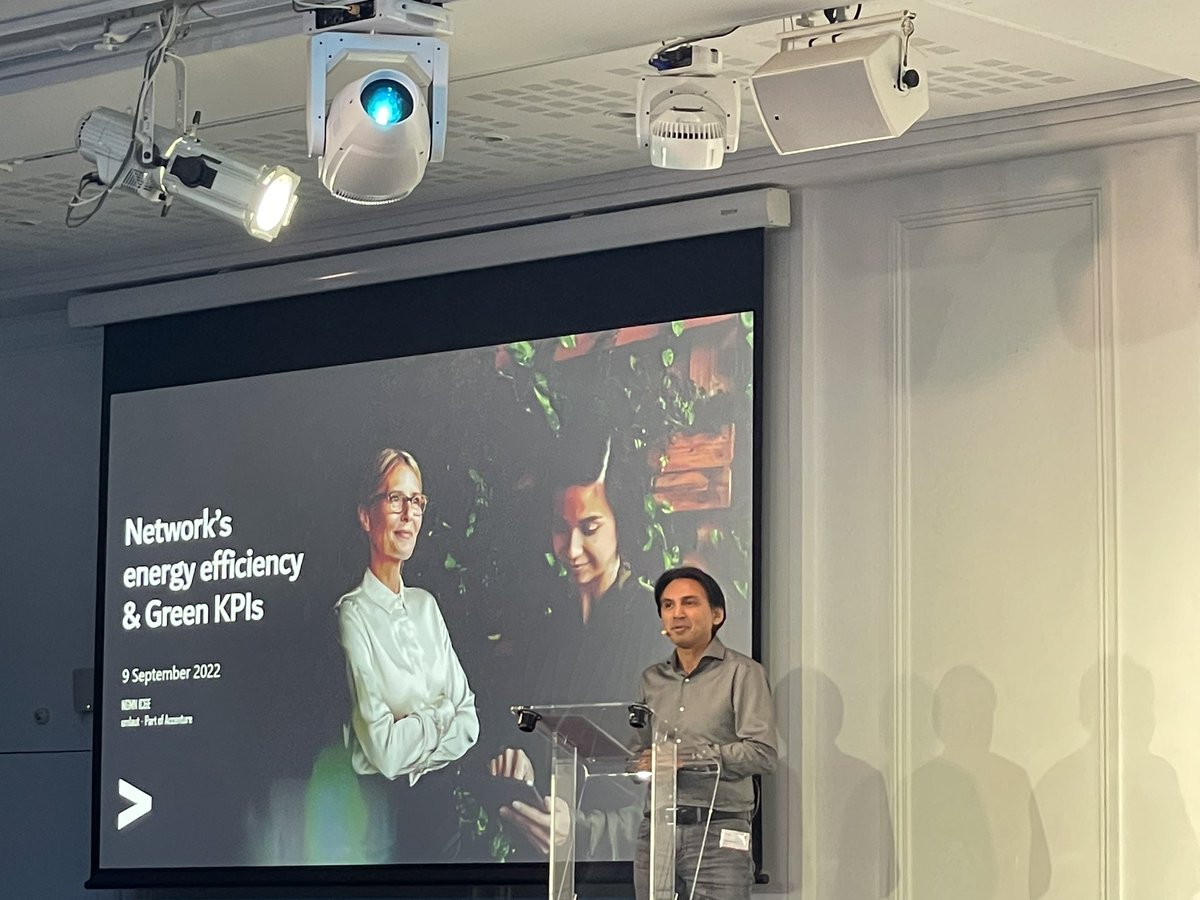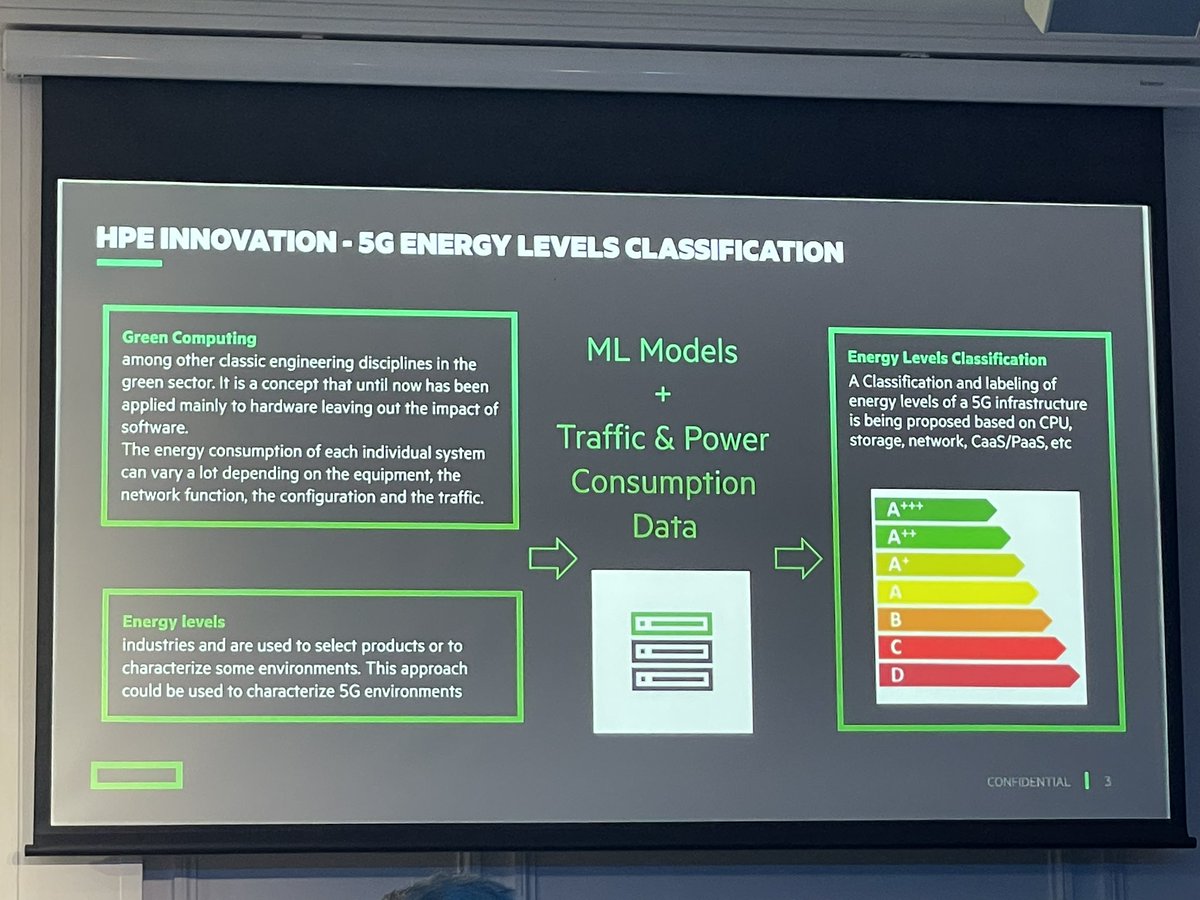
Back to Day 2 of @NGMN_Alliance #NGMNICE22 moderated by @guydaniels of @TelecomTV
Sessions today are about green networks & sustainability
Solemn introductions by Guy & Antia Doehler of NGMN commemorating yesterday's sad loss of the Queen
Sessions today are about green networks & sustainability
Solemn introductions by Guy & Antia Doehler of NGMN commemorating yesterday's sad loss of the Queen
@NGMN_Alliance @guydaniels @TelecomTV First speaker is @martineaus , a #COP26 adviser on sustainability, setting wider global & societal context for the telecom industry.
Notes GSMA stats (31% more traffic, 5%+ electricity, 2%+ CO2 in 2021) show that they are "decoupled". But notes that last number must fall
Notes GSMA stats (31% more traffic, 5%+ electricity, 2%+ CO2 in 2021) show that they are "decoupled". But notes that last number must fall
Interestingly that suggests to me one of the more absurd arguments I've heard recently "we must reign in data traffic growth to reduce CO2 emissions" or "don't send that email" (!!) is a fallacy.
We know it, sustainability advisers know it, so let's stop pretending bits = CO2
We know it, sustainability advisers know it, so let's stop pretending bits = CO2
Listing "6 action areas for 6G"
- virtualisation = dematerialisation, needs less "stuff"
- zero-waste & recycling-led "circular business models" (mentions huge impact of steel, concrete etc in networks, not just electronics)
- design networks that can survive 2degC+ climate
- virtualisation = dematerialisation, needs less "stuff"
- zero-waste & recycling-led "circular business models" (mentions huge impact of steel, concrete etc in networks, not just electronics)
- design networks that can survive 2degC+ climate
- Connectivity for all (that's a challenge for 6G affordability vs. capabilities I think). Personally I think that's a 4G/5G thing (or other techs
- Assisting resilience & decarbonisation for consumers
- "Deliberative lobbying" - aligning all govt advocacy goals with net zero
- Assisting resilience & decarbonisation for consumers
- "Deliberative lobbying" - aligning all govt advocacy goals with net zero
Next is Saima Ansari of DT talking through its sustainability journey. She’s also the main green network rep for NGMN itself
Noting that it’s important to understand how / where green energy is generated and stored. DT building some of its own capacity

Noting that it’s important to understand how / where green energy is generated and stored. DT building some of its own capacity


Notes that Scope 3 is 98% of total DT emissions, from suppliers & impact on customers
Huge challenge & needs close cooperation with suppliers to deal with this
Huge challenge & needs close cooperation with suppliers to deal with this

Next up is @Accenture umlaut arm’s CEO talking about green network KPIs
Makes a good point about the need for a good baseline to compare improvements against

Makes a good point about the need for a good baseline to compare improvements against


Important to have actionable & manageable green network KPIs that are comparable across companies and geographies 

There’s a hidden angle to this slide IMO
A tricky issue for the 5G/6G mobile industry will be what to do, where there is lower CO2 impact for a given device or application to use fibre+WiFi instead
There could be a lot of energy-inspired offload in future
A tricky issue for the 5G/6G mobile industry will be what to do, where there is lower CO2 impact for a given device or application to use fibre+WiFi instead
There could be a lot of energy-inspired offload in future

Interesting energy efficiency classification model from @HPE - curious to know how they view “traffic models” in this context 

Seems like a cool idea to improve 5G “sleep mode” by using AI to guess where devices are, rather than reporting all the time 

Interesting to see @HPE view of #6G priorities such zero energy devices, as well as water savings & land usage 

Btw - I just published this post about some of the geopolitics & harmonisation debate from yesterday's #6G session
linkedin.com/posts/deanbubl…
linkedin.com/posts/deanbubl…
Now @Deloitte with a really good slide on impact on energy consumption with network changes
I’m not sure what “nitrogen backup” is though
I’m not sure what “nitrogen backup” is though

I’m really not convinced that “circular” and recycling / waste issues should be that tightly coupled to energy/CO2 use
Various aspects of sustainability are important, but I think energy is 10x or 100x more urgent
Also an argument to separate E from S & G in ESG
Various aspects of sustainability are important, but I think energy is 10x or 100x more urgent
Also an argument to separate E from S & G in ESG

Now @VodafoneGroup up at #ngmnice22
A bit unclear how things like outsourcing to 3rd party towercos fit here
Notable that JVs (presumably including network sharing) only halved by 2030
A bit unclear how things like outsourcing to 3rd party towercos fit here
Notable that JVs (presumably including network sharing) only halved by 2030

Not convinced with the energy / GB calculation by @VodafoneGroup here
Need to separate out by MBB vs FWA, rural vs urban, indoor vs outdoor, freq bands etc
Aggregate figures on “traffic growing exponentially” can obscure critical detail. It’s bad statistical practice
Need to separate out by MBB vs FWA, rural vs urban, indoor vs outdoor, freq bands etc
Aggregate figures on “traffic growing exponentially” can obscure critical detail. It’s bad statistical practice

Interesting chart of different options for sourcing low/zero carbon energy
Personally I’m curious to know which telco will be the first to have its own small modular nuclear reactor & hydrogen electrolysis plants
Personally I’m curious to know which telco will be the first to have its own small modular nuclear reactor & hydrogen electrolysis plants

In Scope 3, looks like Purchased Goods & Services + JVs are a huge chunk
I suspect that the roles of towercos and network-sharing JVs are being greenwashed out of some telcos’ reported CO2
We should be wary of interpreting press releases about progress on Net Zero
I suspect that the roles of towercos and network-sharing JVs are being greenwashed out of some telcos’ reported CO2
We should be wary of interpreting press releases about progress on Net Zero

Now @6WINDsoftware talking about energy impact of various virtualised network functions 

Ah, the inevitable ignorant Q
"How can we stop customers wasting data" - typical tosh about 4K/8K video & "blame Netflix"
Usual irrelevant comment on valuations of cloudcos vs telcos
Thinly veiled attempt to align with stupid "tax the cloud" some telco dinosaurs are pitching
"How can we stop customers wasting data" - typical tosh about 4K/8K video & "blame Netflix"
Usual irrelevant comment on valuations of cloudcos vs telcos
Thinly veiled attempt to align with stupid "tax the cloud" some telco dinosaurs are pitching
(In the interests of saving energy, I hope you'll appreciate that's a low-res GIF. And I posted it over Wi-Fi rather than cellular)
KPN speaker now noting that huge savings of energy have been made in the network (down 45% despite 24x growth in traffic) largely because of copper switch-off
Saying mobile may be harder because of frequency choices
But once again, traffic volumes & energy can be decoupled
Saying mobile may be harder because of frequency choices
But once again, traffic volumes & energy can be decoupled
Policymakers & regulators should be *extremely* skeptical of telecom lobbyists trying to use data volume growth as another reason to push back on Internet / cloud companies and "full Internet access" or neutrality
Disingenuous & credibility-damaging telcowash
Disingenuous & credibility-damaging telcowash
And another sustainability cliche coming out... 5G "enabled" savings in energy consumption elsewhere in industry
The idea that the network (& 5G specifically) is somehow responsible for 100% of any CO2 savings from smart factories, cities, transport etc. is totally ridiculous
The idea that the network (& 5G specifically) is somehow responsible for 100% of any CO2 savings from smart factories, cities, transport etc. is totally ridiculous
Slightly weird concept of adding small wind turbines to large cell towers
Can potentially generate 2/3 of tower power needs. Not sure how well that translates to smaller urban monopoles, rooftops etc but I guess could be good for rural sites

Can potentially generate 2/3 of tower power needs. Not sure how well that translates to smaller urban monopoles, rooftops etc but I guess could be good for rural sites


Putting 750 units on 52 Vantage towers in Germany this year
Aiming for 50K units over next few years
Aiming for 50K units over next few years
Good slide from @nokia on energy efficiency in mobile infrastructure
Liquid cooling is a new one for me. Makes sense
Liquid cooling is a new one for me. Makes sense

This is cool (well, warm). Nokia is pitching using waste heat from cell sites for hot water production
May have regulatory hurdles (& poses carbon “accounting” complexities), but it’s clever thinking
May have regulatory hurdles (& poses carbon “accounting” complexities), but it’s clever thinking

Interesting set of stats from @ericsson - networks consume about 12x the energy of datacentres 

• • •
Missing some Tweet in this thread? You can try to
force a refresh





